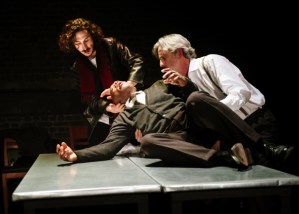Review: The Plague (Arcola)
Director Neil Bartlett’s production is an adaptation of Albert Camus’ ”La Peste”
The Plague starts surreptitiously, with a few dead rats piled up on the streets, but Albert Camus’ great allegorical novel catches quickly. In no time at all, an epidemic sweeps through the small town of Oran. Flu-like symptoms spread. Deaths mount. Systems start to collapse. Once it’s in, it’s off. There’s no stopping it.
What a moment to plonk it onstage – just as everything feels like it’s sliding out of all control. Neil Bartlett cloaks Camus’ story in contemporary clothing. His adaptation starts, after the event, at the sort of post-facto tribunal we see all the time. Five people sit at a long metal table, leaning into microphones to recount events: the oddity of those rats, the first cases dismissed as common colds, a cautious committee slow to respond. In the middle, Sara Powell’s haunted Dr Rieux, her eyes racing, her thoughts elsewhere, struggles to convey the seriousness of the situation – both in the past and in the present. Bartlett lets the two merge together. Testimony twists into terror. Re-enactments rekindle the past.
Tribunals have one eye on the future, but, as Bartlett suggests, they’ve one foot in the past as well. Published in 1947, The Plague can be read as a metaphor for the French resistance movement and, at a time when far-right nationalism is rising once again, Bartlett’s framing device can’t but recall past tribunals. It asks whether we ever truly learn from the past – a point that doubles up on the 70th anniversary of this literary classic. His cast eyeball us throughout: will we listen?
However, Bartlett’s best move is to commit to the story in its own right. He takes the plague seriously and, rather than underlining the allegory, pointing out some parallel or other, he lets it breath. As a result, the epidemic is many things at once: rising xenophobia and contagious radicalism, economic collapse and an influx of refugees and, yes, even an actual epidemic. It’s any danger that catches us off-guard, slips through the net and spreads through society. It sits, perfectly, with the air of anxiety and Bartlett’s production has an itchy urgency that both grips and unsettles. Dinah Mullen shoots sirens and gunshots through the space.
Barlett’s "state of plague" recalls our own semi-permanent state of emergency and, if nothing else, The Plague shows the sheer inevitability of systemic failure – we assume the best until the worst confirms itself. "People," the tribunal concludes, "are always the same." And, in the end, as the plague comes under control on an elegiac note, hope creeps back in and starts to spread.
The Plague runs at the Arcola until 6 May.













